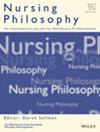从行动者网络理论的角度探讨健康不平等问题
IF 2.5
3区 医学
Q1 NURSING
引用次数: 0
摘要
社会理论在护理学科和护理探究中发挥着重要作用,因为它有助于从概念上将护理纳入社会世界的大背景中。例如,广泛的批判理论为揭示不公平和压迫的社会状况提供了独特的视角。在社会学理论中,行动者网络理论(ANT)是一种研究和分析方法,最近受到了护士哲学家和研究人员的关注。以行动者网络理论为指导的研究试图理解人类和非人类行动者之间的关系所构成的相关现象,从而理解护理实践是如何共同创造/执行的,以及如何使其更加人性化。在本文中,我们介绍了 ANT 在研究患有临终疾病的被监禁者获得姑息治疗以及吸毒者获得医疗服务方面的益处。我们认为,关注医疗实践的物质性有助于促进这些群体的健康公平。本文章由计算机程序翻译,如有差异,请以英文原文为准。
Exploring health inequities through the actor‐network theory lens
Social theory plays an important role in the nursing discipline and nursing inquiry as it helps conceptually embed nursing in the larger picture of the social world. For example, a broad category of critical theory provides a unique lens for uncovering social conditions of inequity and oppression. Among the sociological theories, actor‐network theory (ANT) is an approach to research and analysis that has recently gained interest among nurse philosophers and researchers. Studies guided by ANT seek to understand phenomena of interest as constituted within the relationships between human and nonhuman actors to understand how care practices are co‐created/enacted and how they can be made more humane. In this paper, we describe the benefits of ANT for examining healthcare access for incarcerated individuals with life‐limiting illnesses accessing palliative care and for people using illicit drugs. We argue that attention to the materiality of care practices can contribute to efforts of advancing health equity for these groups.
求助全文
通过发布文献求助,成功后即可免费获取论文全文。
去求助
来源期刊

Nursing Philosophy
NURSING-
CiteScore
4.80
自引率
9.10%
发文量
39
审稿时长
>12 weeks
期刊介绍:
Nursing Philosophy provides a forum for discussion of philosophical issues in nursing. These focus on questions relating to the nature of nursing and to the phenomena of key relevance to it. For example, any understanding of what nursing is presupposes some conception of just what nurses are trying to do when they nurse. But what are the ends of nursing? Are they to promote health, prevent disease, promote well-being, enhance autonomy, relieve suffering, or some combination of these? How are these ends are to be met? What kind of knowledge is needed in order to nurse? Practical, theoretical, aesthetic, moral, political, ''intuitive'' or some other?
Papers that explore other aspects of philosophical enquiry and analysis of relevance to nursing (and any other healthcare or social care activity) are also welcome and might include, but not be limited to, critical discussions of the work of nurse theorists who have advanced philosophical claims (e.g., Benner, Benner and Wrubel, Carper, Schrok, Watson, Parse and so on) as well as critical engagement with philosophers (e.g., Heidegger, Husserl, Kuhn, Polanyi, Taylor, MacIntyre and so on) whose work informs health care in general and nursing in particular.
 求助内容:
求助内容: 应助结果提醒方式:
应助结果提醒方式:


